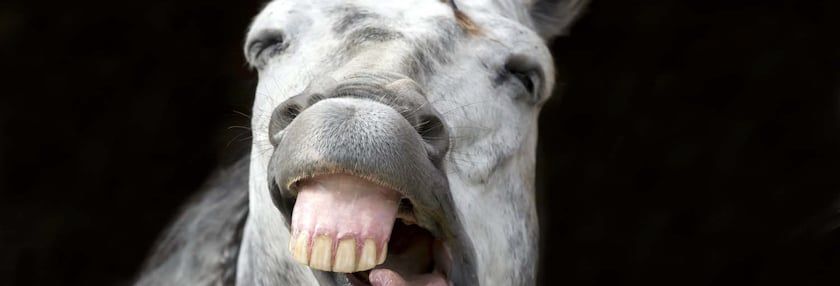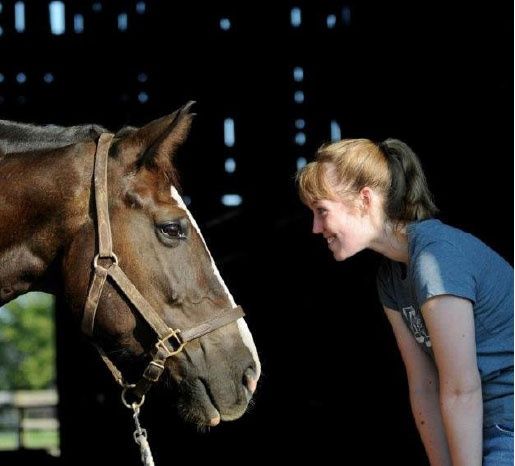Open Wide!


Does your horse’s dentist need a DVM degree?
When your horse has a medical issue, most people think nothing of a quick call to their veterinarian. When they need to have their horse’s teeth looked at though, it becomes less clear who to reach out to.
In some areas, there is a wealth of veterinarians who specialize in equine practice. There are also a decent number who focus solely on equine dentistry. In other places though, horse owners may have fewer options for people to care for equine teeth.
Blacksmith knowledge
In early days of equestrianism, teeth were dealt with by the local farrier, in part because they had a range of rasps and files on hand. In the 18th and 19th centuries, blacksmiths were expected to have some basic medical knowledge beyond the foot. They were the source of various home remedies and were asked to diagnose lamenesses that went beyond hooves.
In the modern era, there is a division between the practice of veterinary medicine and farriery in terms of the required education and licensure. Veterinarians must meet certain educational requirements and be in good standing with the state veterinary licensing board; farriers may go through an optional certification process or may apprentice with an existing expert, but they don’t have to pass a state licensing test.
They could just as easily purchase the needed tools, hang out a shingle, and learn as they go.
Even as the practices of farriers and equine veterinarians have diverged, there are still farriers who will offer to float horses’ teeth, or people who advertise themselves as equine dentists but who aren’t veterinarians.
Modern education and knowledge
Some equine dentists or equine dental technicians have gone through an education or certification course to validate their skills.
Many who have used a layperson for a teeth float have been pretty happy with the results, but I prefer to leave that work to a veterinarian. Here are a few reasons why:
- The person floating a horse’s teeth likely isn’t (or shouldn’t be) giving the same application to every horse they see; they’d be expected to modify their routine to respond to a horse’s individual needs, which requires some degree of diagnostics about what issues that horse has.
If the person discovers a problem, like a chipped or broken tooth, or a pocket of infection, they need to be qualified to deal with that, too.
- Examining a horse’s mouth and making diagnoses about their dental health could, in many states, be considered “practicing veterinary medicine.” Some states expressly forbid anyone except licensed veterinarians to work on horses’ teeth, while others leave it more open as to whether lay people can float teeth.
- A light sedation is often used for a teeth float or dental exam, because that helps the dentist feel confident as they work with files or power tools on the horse. That typically requires an intravenous injection of a prescription product. While many of us know how to give a shot in an emergency, veterinarians are uniquely trained to watch for signs a horse is over- or underwhelmed by the drug.
- My equine veterinary dentist also does a general exam on my horses when she comes to do their teeth; abnormal findings in their weight, temperature, or blood pressure could all help identify problems with the mouth, such as a horse losing the ability to chew food properly.
- Your regular veterinarian also knows that horse’s medical history during a dental exam and what medications they’re currently on. This could be important if sedation or any subsequently prescribed drugs could interact with existing regimes, supplements, or diagnosed conditions.
- If the dentist spots a problem requiring further diagnostics—like radiographs, or surgery to remove a tooth—a veterinarian will be in a better position to do those diagnostics more quickly than a lay person.
- In the event something goes wrong with your horse, your recourse is limited when you engage a lay person. If they’re not licensed, the state cannot take action against their license, and the only avenue likely available to you would be civil court. A non-licensed practitioner also may not be required to carry insurance.
Ultimately, it’s each horse owner’s choice to have work done on their animal’s mouths. I pay very slightly more to have a veterinarian do my horses’ dental exams, but for me, the extra peace of mind is worth it.
For more information
No, you should NOT float teeth yourself. https://www.riversidehorsefarm.com/horse-teeth-floating/
Tags:Horse Sense

Acreage Life is part of the Catalyst Communications Network publication family.
















